Aloe Vera For Acne: 9 Easy DIY Remedies To Try
Get clean and clear skin with the therapeutic properties of this soothing natural gel.
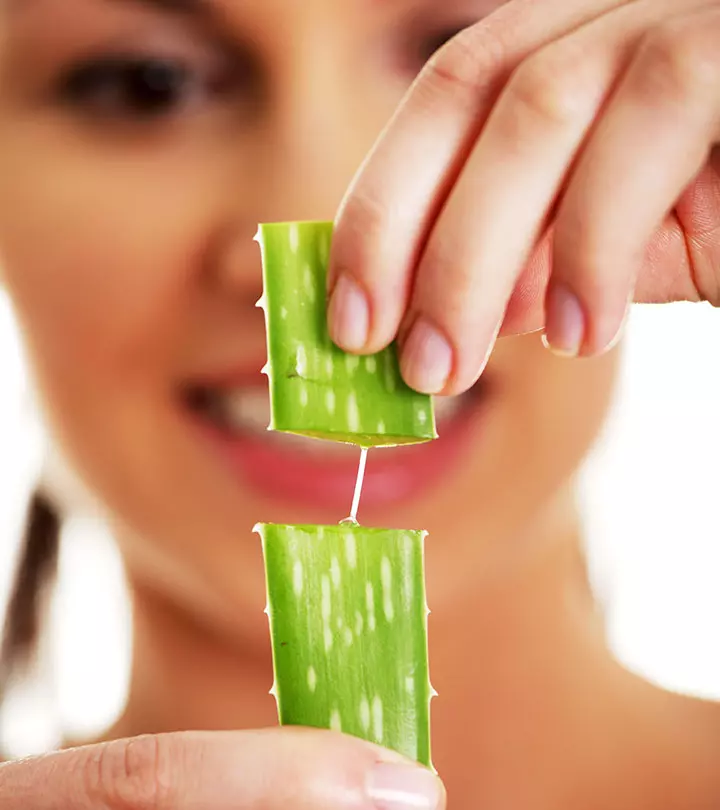
Image: Shutterstock
Acne affects up to 50 million Americans every year, making it the most common skin condition in the United States (1). And most of us often resort to home remedies for mild to moderate acne. One such popular natural remedy is using aloe vera for acne. But does aloe vera help acne? Yes! The pulp of this herb is commonly used to heal minor cuts, burns, and rashes. In addition, it can soothe inflammation and may also minimize acne. Want to know how? Read on to learn more about using aloe vera for acne treatment, ways to use it for your skincare, and potential risks.
In This Article
Is Aloe Vera Good For Acne? What Does Science Say?
Yes. Aloe vera can prevent acne as it has anti-inflammatory properties due to the sugars and fatty acids present in it (2). It has several other properties that make it a safe option for protecting your skin and preventing inflammation:
- Pure aloe vera gel contains about 75 active ingredients, which include amino acids, salicylic acid, lignins, vitamins, minerals, saponins, and enzymes (2).
- Aloe vera also promotes collagen synthesis and helps in fast healing of wounds and scars (2). This property is beneficial in healing acne scars and blemishes.
- It protects your skin from inflammation, damage, and skin hypersensitivity caused by UV exposure (2).
- It also helps in moisturizing your skin, promoting elastin and collagen production, and prevents the formation of wrinkles (3).
- The amino acids and zinc in aloe vera soften your skin and tighten the skin pores (2).
A study published in 2014 examined the effect of a combination of aloe vera gel and acne medication on 60 subjects. Researchers concluded that the combination of aloe vera gel (50%) and topical retinoidsi A class of chemical compounds derived from vitamin A, used in cosmetics to boost collagen and reduce aging signs. (0.5%) was much more effective in healing acne than placebo (4). Also, it was well tolerated by the subjects.
Another study evaluated the efficacy of a combination of propolis, tea tree oil, and aloe vera in healing acne lesions. It compared the results with another group that was treated with erythromycin cream. It concluded that the combination of aloe vera gel (10%), tea tree oil (3%), and propolisi A compound produced by honey bees by mixing saliva with bee wax, widely used to fight infections and heal wounds. (20%) was more effective in reducing the severity of acne, total lesion count, and erythema scars (5).
So, is aloe vera good for pimples? Yes, as stated above, it may help in reducing acne. You can use aloe vera to treat pimples and inflammation as it helps tighten skin pores and may aid sebum control. Many skin experts recommend using aloe vera face packs to soothe and treat inflamed skin. However, if you are allergic to aloe vera, using it on your skin may cause rashes and allergic reactions. Although topical aloe vera gel (pure) is safe for the skin, do a patch test to determine if you are allergic to it. Scroll down for some easy recipes to use aloe vera for acne.
 Trivia
TriviaKey Takeaways
- Aloe vera may help treat acne scars, moisturize the skin, and tighten skin pores.
- You can mix aloe vera with it with apple cider vinegar, lemon juice, or tea tree oil to treat acne.
- Topical application of aloe vera may cause contact dermatitis and swollen eyelids.
- Avoid consuming aloe vera as it may cause diarrhea and hypersensitivity reactions.
How To Use Aloe Vera For Acne
1. Pure Aloe Vera Gel For Acne
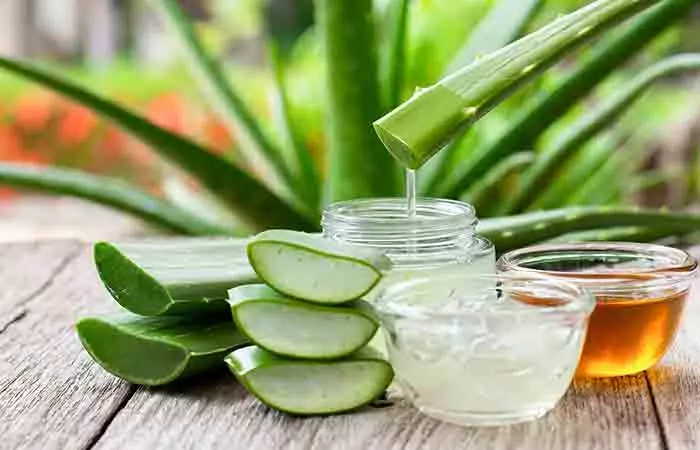
What To Do: Cut the aloe leaf and scoop out the transparent, fleshy part with a spoon. Apply the aloe vera gel on your face, focusing on the affected area. Leave it on overnight. Rinse it off in the morning and repeat every day until the lesionsi A wound or damaged tissues inside or outside the body caused by trauma or disease. heal.
 Stylecraze says
Stylecraze says2. Aloe Vera, Honey, And Cinnamon
Aloe vera can help control acne as it has antibacterial properties and is effective against acne-causing bacteria. It also reduces inflammation and promotes wound healing, which makes it good for mild to moderate acne (6). Honey and cinnamon gel have also been studied and found to have similar effects on acne (7), (8). Combining these three ingredients in your DIY and at-home masks will increase your chances of having smooth, clear, and acne-free skin.
What To Do: Mix two tablespoons of pure aloe vera gel with four tablespoons of honey and half a teaspoon of cinnamon powder or oil. Apply the mixture to the affected area and wash it off after 10 minutes. Repeat this every alternate day.
Note: Cinnamon powder might sting, so you can adjust the quantity as per your skin’s tolerance level.
3. Aloe Vera And Lemon Juice
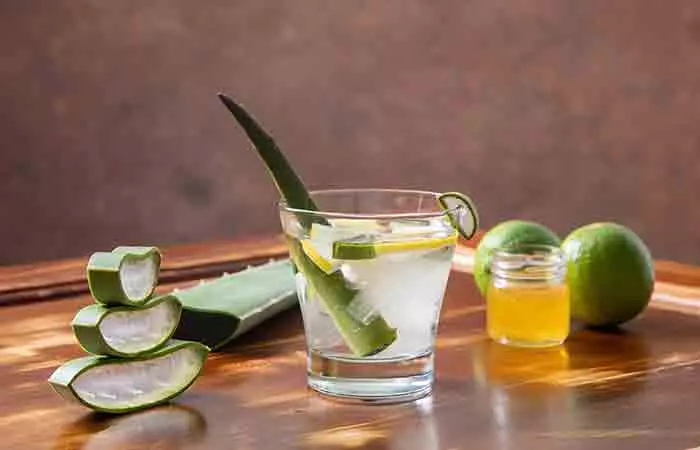
Lemon juice is a common remedy used for many skin issues, including acne. It has astringent (drying) properties (9). Thus, it may help dry out pimples and reduce acne.
Caution: Do not use this remedy if you have sensitive skin as lemon juice can cause redness and irritation. Excess lemon juice can also dry out your skin.
What To Do: Mix ¼ teaspoon of lemon juice with 2 tablespoons of aloe vera gel. Apply the mixture TO the affected area. Wash it off after it dries. Also, use sunscreen afterward if you are going out as lemon makes your skin photosensitive.
4. Aloe Vera And Tea Tree Oil
The topical application of 5% tea tree oil is beneficial in managing mild to moderate acne and reducing inflammation (10).
What To Do: Dilute 2-3 drops of tea tree oil in any carrier oil (jojoba or sweet almond or olive oil). Mix it with a tablespoon of honey and apply it to the affected area. Leave it on for 15 minutes before washing it off.
5. Aloe Vera Spray Or Face Mist
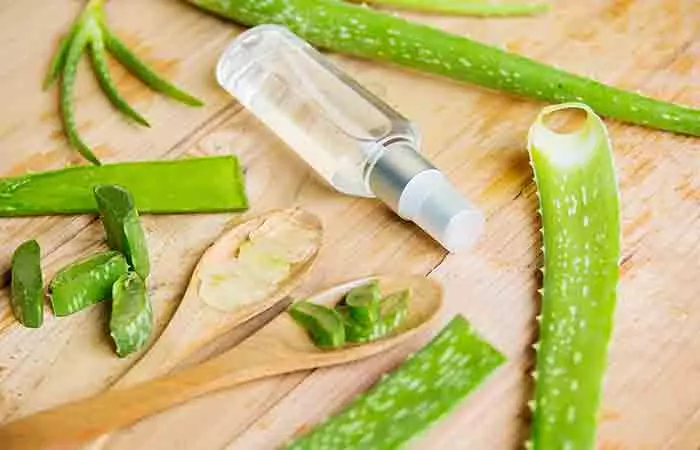
You can also make a facial mist with aloe vera and use it throughout the day to soothe your skin.
What To Do: Mix a tablespoon of aloe vera gel in 1 ½ cups of distilled water. Add 2-3 drops of any essential oil of your choice (do a patch test before using). Store this solution in a spray bottle and spritz it on your face whenever required. Remember to always shake the bottle well before use.
6. Aloe Vera, Sugar, And Oil Scrub
The accumulation of dead skin cells on your skin is one of the major factors that trigger acne (11). Scrubbing is an effective way to remove dead skin cells.
What To Do: Mix ¼ cup of aloe vera gel with ½ cup of jojoba oil and ½ cup of granulated sugar. Gently massage the scrub on your face before washing it off.
7. Aloe Vera And Apple Cider Vinegar

Apple cider vinegar has antimicrobial properties that may help treat acne (12).
What To Do: Mix a teaspoon of aloe vera juice with one teaspoon of ACV and teaspoon of purified water. Apply the mixture as a toner on your face.
Note: Apple cider vinegar may not suit those with sensitive skin. Avoid using it if your skin is sensitive.
8. Aloe Vera And Almond Oil
Oils make a perfect base for any home remedy.
What To Do: Mix one teaspoon of aloe vera gel with 3-4 drops of sweet almond oil (or any other oil of your choice) and apply it to your face. Wash it off after a few minutes.
9. Aloe Vera Gel, Cucumber, And Rose Water
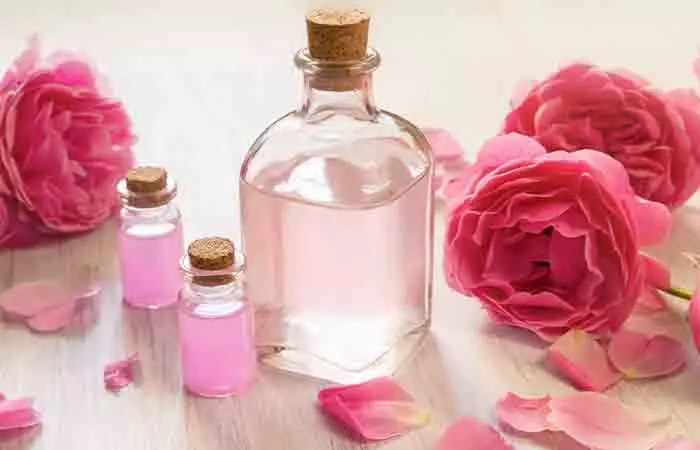
Rosewater acts as an astringent and tones your skin when treating acne (13). Cucumber has a soothing effect on the skin, which may help with acne inflammation (14).
What To Do: Mix a teaspoon each of cucumber juice, rose water, and aloe vera gel. Use a cotton ball to apply the mixture on the affected area or all over your face. Wash it off after it dries.
If you are wondering how long it takes for aloe vera to work its magic on acne? Scroll down to read to know the time it takes to show results.
How Long Does It Take For Aloe Vera To Work On Acne?
Anecdotal evidence suggests that using aloe vera gel or aloe vera-based skin care products twice daily may show visible results after 2-3 weeks of consistent use. However, a study showed that using aloe vera gel, paired with ultrasound technology, showed visible reduction in acne symptoms like pustules, papules, and skin roughness after two months of consistent use (6). For best results, consult your dermatologist to know if you should use aloe vera gel as a standalone treatment or in combination with medication or ointments, based on the severity of your acne condition. If you do not notice any improvement even after using aloe gel for two weeks, please consult your doctor.
Ritu Rathee, a beauty vlogger, tried raw aloe vera gel as a mask on her forehead acne for 7 days and claimed to have amazing results. In one of her vlogs, she says, “It [the skin] has become a lot more smoother. I won’t say it’s, like, super clear right now but yes, the situation has improved a lot over a period of time (i).”
Though aloe vera is an effective treatment for acne, it also comes with potential risks. Check them out below.
Potential Risks Of Using Aloe Vera For Acne
People who are allergic to tulips, garlic, and onions are usually allergic to aloe vera, as well. Hence, it is better to do an allergy test before using aloe vera on your skin.
Avoid applying aloe vera to deep cuts and severe burns.
Topical aloe vera is usually not harmful to the skin (unless you are allergic to it), and an allergic reaction to topical aloe vera is rare. However, there was one case where a 72-year-old woman, who had been using home-made aloe vera juice on her legs, developed allergic dermatitisi An umbrella term for skin irritation and inflammation characterized by itching, redness, and rashes. on her legs and erythemai Redness of the skin or mucous membrane caused by increased blood flow to that area. on her eyelids (15).
Avoid ingesting aloe vera. It contains latex, which is a laxativei A compound that helps increase mobility, bulk, and stool frequency and relieves constipation. . It may cause diarrhea, pseudomelanosis colii A pigmentation disorder of the colon wall associated with chronic laxative use. , kidney failure, hypokalemiai A condition caused by low blood potassium levels, which can cause muscle cramps, fatigue, and abnormal heart rhythms. , and other hypersensitive reactions (16). Moreover, it may interact with the other medications you may be taking and reduce their absorption and effectiveness. Consult a doctor if you are considering taking aloe vera orally.
If you have mild to moderate acne, you can use aloe vera gel for treating it. We are not referring to store-bought aloe vera gel but the sap that you get when you cut the aloe vera leaf.
People have been using aloe vera for centuries now for treating skin issues. Hence, it is a good idea to incorporate aloe vera into your skincare routine. Although there are very rare chances of aloe vera causing any serious side effects, it is better to be aware of the associated risks.
Infographic: Most Easy Ways Of Using Aloe Vera For Acne
The use of aloe vera for treating minor cuts and getting clear skin is prevalent and dates back to the days when cosmetic products were not readily available. Aloe vera can be mixed with different ingredients to get clear skin, as discussed in the article. But to know the easiest ways of using aloe vera for acne, check out the infographic below.
Some thing wrong with infographic shortcode. please verify shortcode syntax
Aloe vera effectively soothes inflammation, redness, and pain associated with acne. If you want to use aloe vera for acne, follow the DIY remedies suggested in the article. However, remember that the remedies may help soothe only mild to moderate breakouts. Do not solely rely on aloe vera for healing acne, as this skin condition is caused by internal and external factors. Therefore, consult a doctor for a proper diagnosis, determine the reason behind the breakouts, and follow the prescribed treatment and suggestions for effective healing.
Frequently Asked Questions
Can I use aloe vera for pimples and dark spots?
You can use it for pimples. However, it may not help reduce dark spots.
Can I use aloe vera for acne scars?
You can use it to soothe your skin, but it is not very effective on acne scars. Use aloe vera on acne to prevent scarring.
Does drinking aloe vera gel help with acne?
A study found that oral ingestion of pure aloe vera gel helped reduce mild acne (16). However, oral aloe vera may also cause toxicity and skin rashes (due to the presence of latex). Consult a doctor before ingesting aloe vera.
How long does aloe vera take to remove pimples?
Anecdotal evidence suggests that using aloe vera twice a day may show noticeable results in a couple of weeks and helps in complexion improvement.
Can aloe vera cause pimples?
Possibly not. There’s a lack of evidence suggesting that aloe vera causes pimples. It is widely known for its soothing antibacterial properties that help prevent breakouts.
Is it safe to use aloe vera daily for acne treatment?
Yes, using aloe vera daily on your skin is completely fine for acne treatment. However, always do a patch test before topical application to prevent allergic reactions.
Is aloe vera appropriate for all skin types?
Aloe vera is generally considered appropriate for all skin types due to its soothing and hydration properties. However, individuals with sensitive skin and those allergic to latex should always do a patch test before using it. Consult a doctor before using or if you experience any adverse reaction.
Wondering if aloe vera can help reduce acne? Watch the below video as real results unfold, revealing whether it can truly clear acne and fade scars or not.
Personal Experience: Source
StyleCraze's articles are interwoven with authentic personal narratives that provide depth and resonance to our content. Below are the sources of the personal accounts referenced in this article.
i. 7 DAYS ALOE VERA CHALLENGE | Live Results | does it clear acne/pimple & fade scars??https://www.youtube.com/watch?v=3qQFwX1TXSM
References
Articles on StyleCraze are backed by verified information from peer-reviewed and academic research papers, reputed organizations, research institutions, and medical associations to ensure accuracy and relevance. Read our editorial policy to learn more.
- SKIN CONDITIONS BY THE NUMBERS
https://pubmed.ncbi.nlm.nih.gov/31613567/ - Aloe Vera: A short Review Indian Journal of Dermatology
https://www.ncbi.nlm.nih.gov/pmc/articles/PMC2763764/ - ALOE VERA: A REVIEW OF ITS CLINICAL EFFECTIVENESS
https://www.researchgate.net/publication/269846534_ALOE_VERA_A_REVIEW_OF_ITS_CLINICAL_EFFECTIVENESS - Effect of Aloe vera topical gel combined with tretinoin in treatment of mild and moderate acne vulgaris: a randomized double-blind prospective trial
https://pubmed.ncbi.nlm.nih.gov/23336746/ - Treatment of acne with a combination of propolis tea tree oil and Aloe vera compared to erythromycin cream: two double-blind investigations
https://www.ncbi.nlm.nih.gov/pmc/articles/PMC6298394/ - Efficacy of a New Non-drug Acne Therapy: Aloe Vera Gel Combined With Ultrasound and Soft Mask for the Treatment of Mild to Severe Facial Acne
https://www.ncbi.nlm.nih.gov/pmc/articles/PMC8175793/ - Honey: A Therapeutic Agent for Disorders of the Skin Central Asian Journal of Global Health
https://www.ncbi.nlm.nih.gov/pmc/articles/PMC5661189/ - Efficacy of topical cinnamon gel for the treatment of facial acne vulgaris: A preliminary study
http://bmrat.org/index.php/BMRAT/article/view/515 - Development of a lemon cutting machine
https://www.ncbi.nlm.nih.gov/pmc/articles/PMC4252431/ - The efficacy of 5% topical tea tree oil gel in mild to moderate acne vulgaris: a randomized double-blind placebo-controlled study.
https://pubmed.ncbi.nlm.nih.gov/17314442/ - Acne: Overview InformedHealth
https://www.ncbi.nlm.nih.gov/books/NBK279211/ - Antimicrobial activity of apple cider vinegar against Escherichia coli Staphylococcus aureus and Candida albicans; downregulating cytokine and microbial protein expression
https://www.ncbi.nlm.nih.gov/pmc/articles/PMC5788933/ - Treatment Modalities for Acne Molecules
https://www.ncbi.nlm.nih.gov/pmc/articles/PMC6273829/ - Phytochemical and therapeutic potential of cucumber Fitoterapia
https://pubmed.ncbi.nlm.nih.gov/23098877/ - Allergic contact dermatitis to Aloe vera Contact Dermatitis
https://www.researchgate.net/publication/5972908_Allergic_contact_dermatitis_to_Aloe_vera - Aloe vera: A review of toxicity and adverse clinical effects Journal of Environmental Science and Health Part C
https://www.ncbi.nlm.nih.gov/pmc/articles/PMC6349368/
Read full bio of Vd. Naveen Sharma
Read full bio of Ramona Sinha
Read full bio of Eshna Das
Read full bio of Krati Darak





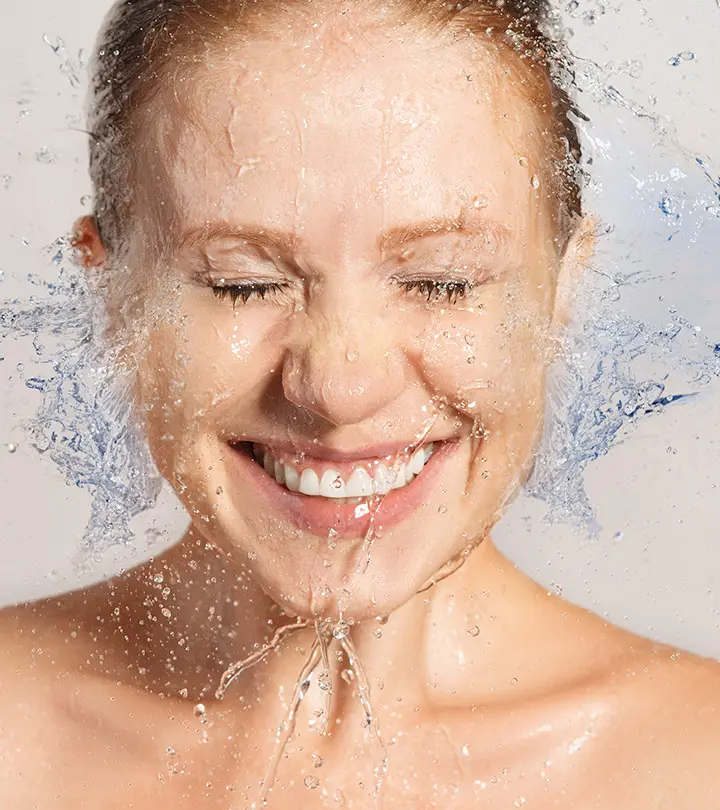
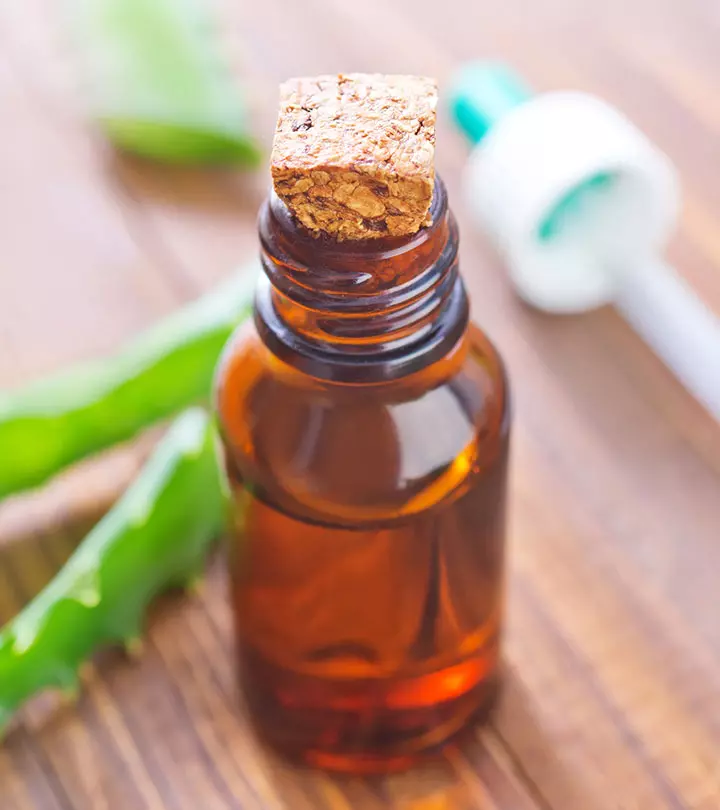

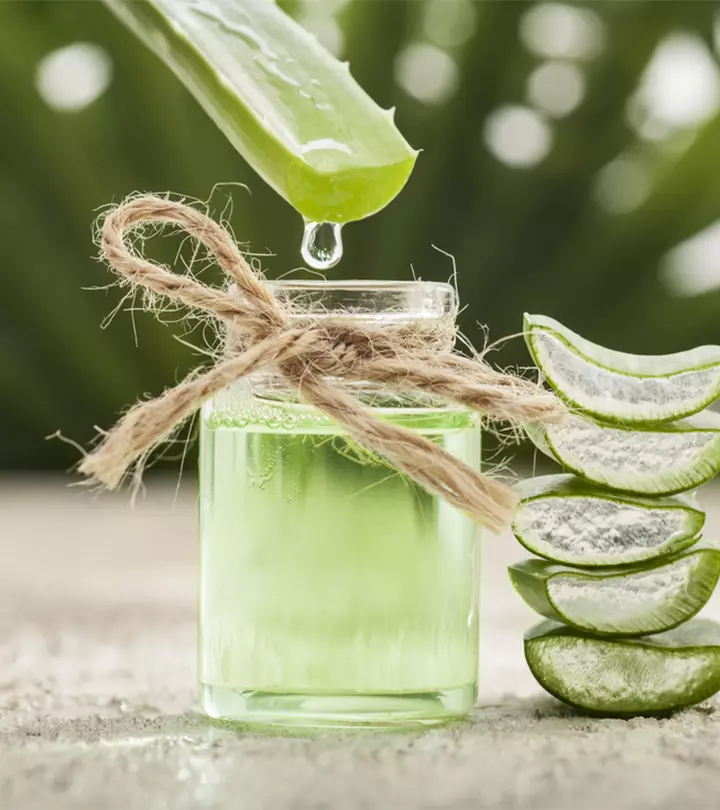
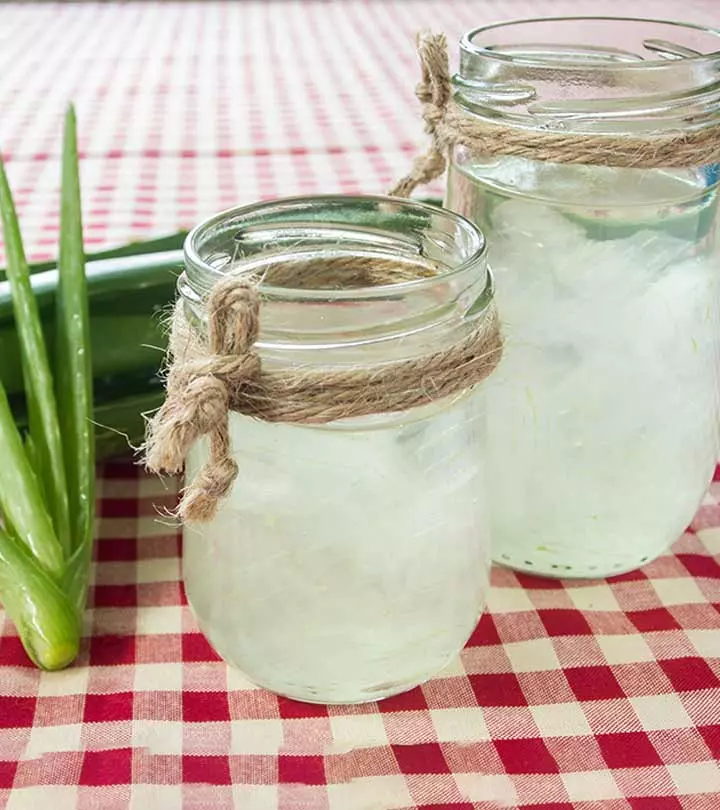
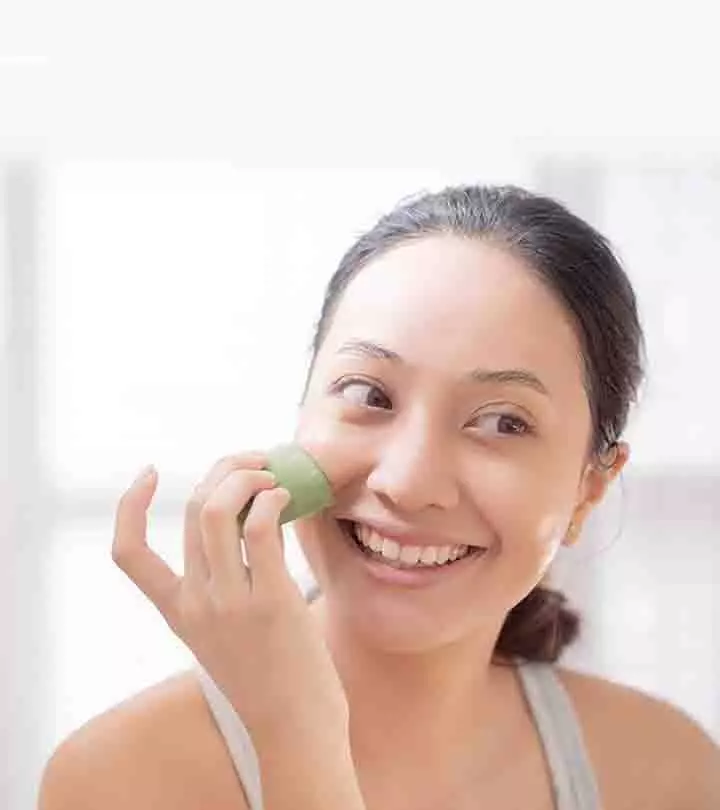
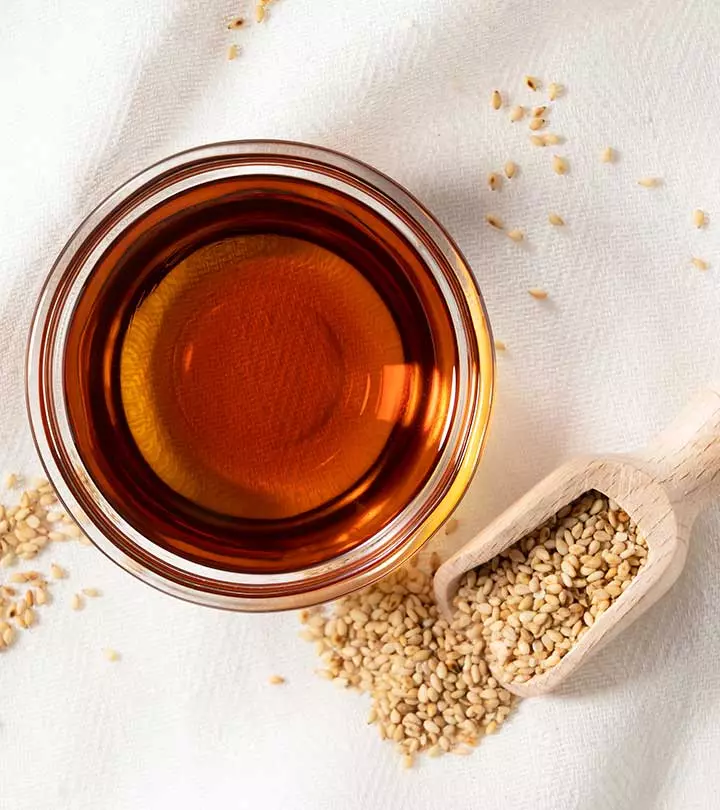
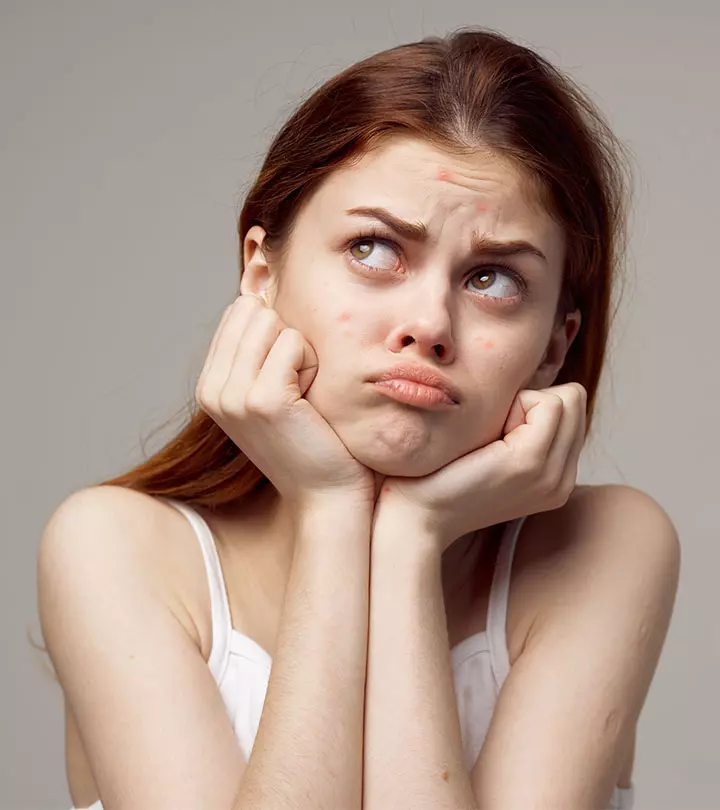

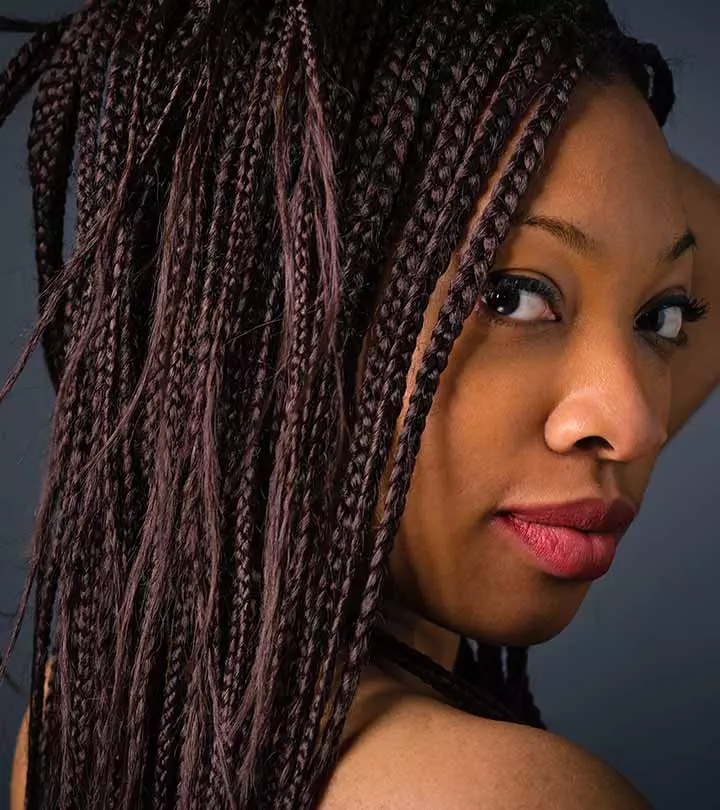
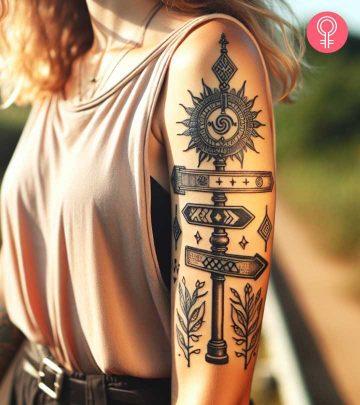


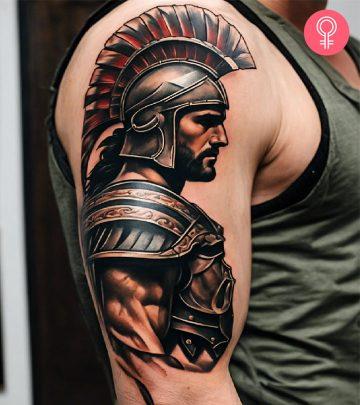
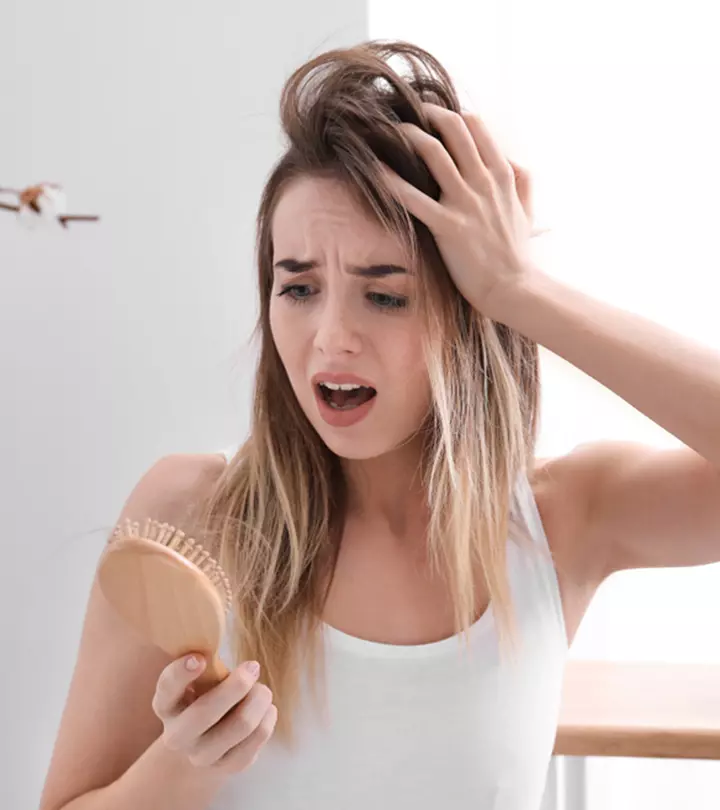

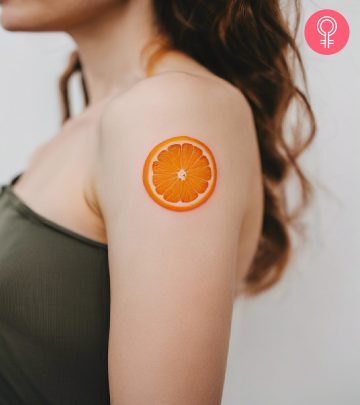
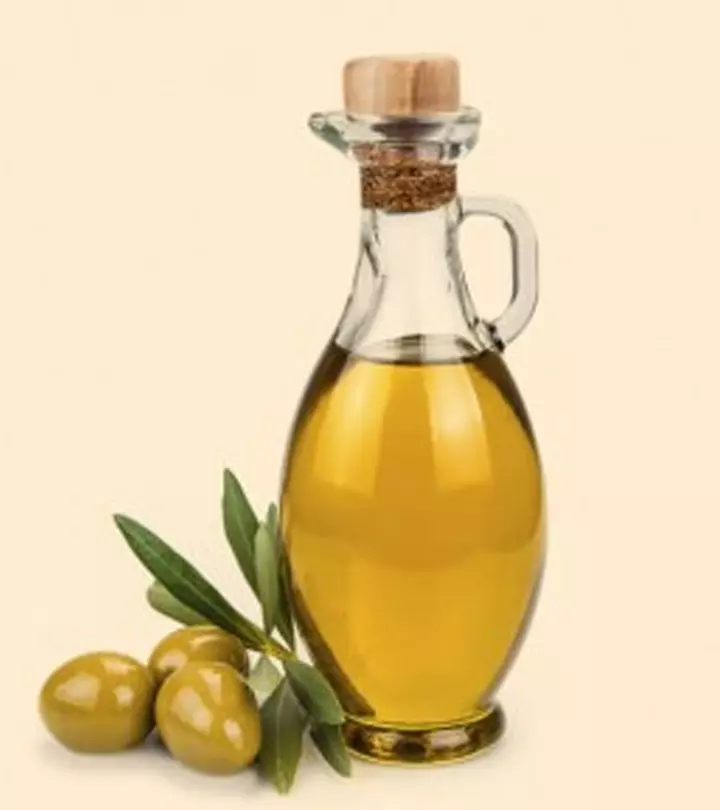
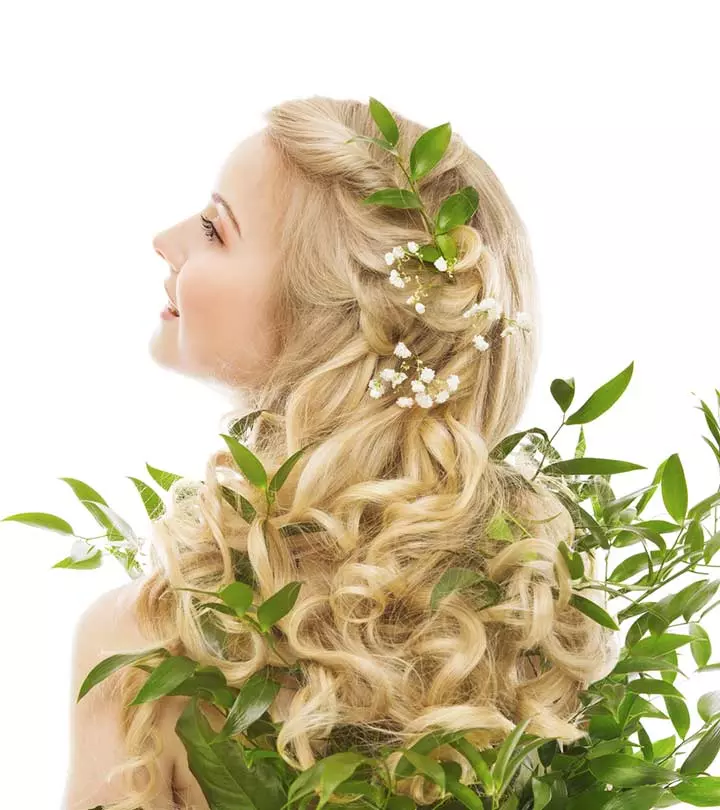
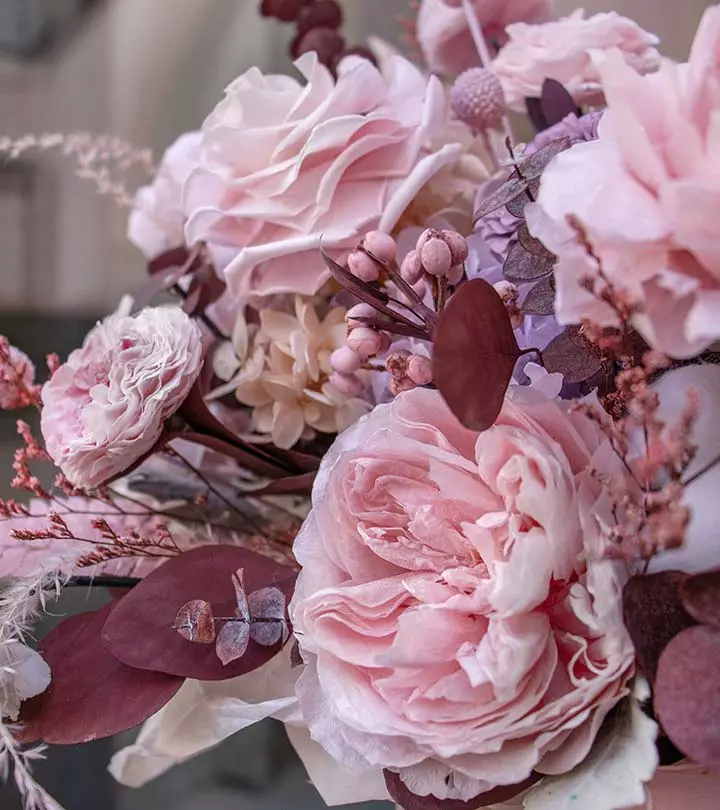
Community Experiences
Join the conversation and become a part of our empowering community! Share your stories, experiences, and insights to connect with other beauty, lifestyle, and health enthusiasts.